Are you a Quiet Speculation member?
If not, now is a perfect time to join up! Our powerful tools, breaking-news analysis, and exclusive Discord channel will make sure you stay up to date and ahead of the curve.
The time after a set release or a major ban is always exciting. The format is in flux, the metagame undefined, and everything seems playable. This is even more true right now, thanks to the ban taking away a metagame pillar. This has in turn renewed interest in Modern, bringing an influx of players and content creators. Which is a good thing: more interest and more players in Modern leads to more attention from Wizards, more competitive play, and also more deckbuilding and innovation. Otherwise, it all goes stale.
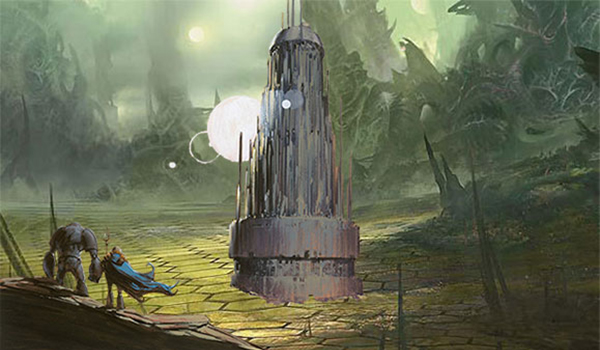
However, it can also be infuriating. Watching an inexperienced player make a mistake will always annoy seasoned veterans, no matter what we'd actually admit. Such anger can still be leveraged productively, specifically by channeling it into helping said new players learn and improve. What is far harder to deal with is experienced players making mistakes when they definitely know better. Especially if they've previously lectured others about said mistake. And it gets downright galling when this is a well-known mistake that has been discussed and dissected extensively by the community for years.
And yet, here I've been watching streamers, general content creators, and even competitors in high-level events acting like they've forgotten basic format knowledge. Which is certainly possible, given how distorted Modern's been since Modern Horizons. So today I'll be venting reminding everyone about the most common mistakes and how to avoid them.
What Isn't a Mistake
I feel I need to define what I'm discussing. A decision or line of play that doesn't work out is not inherently a mistake. A lapse in judgement or missed interaction is a mistake, but forgivable. Magic is a game of imperfect information and great complexity. Everyone makes mistakes and I'm not calling anyone out for being human. Sometimes a calculated risk is the only route to victory and you did the math wrong. Mistakes happen; they're nothing to get angry about. All we can do is try to do better next time.
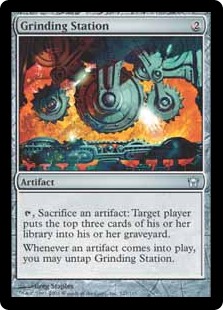 What grinds my gears is lapses in knowledge. This is when a player discusses and/or makes a really dumb play having previously demonstrated that they know better or that they really should know better. There are two scenarios for this, and encountering either triggers me. The first is the equivalent of studying a specific question, writing the correct answer down on a study guide, checking that guide before the test, and walking out of class and commenting on that right answer. And yet when the test comes back you still answered that exact question wrong. There's no explanation or excuse; just brain stop no think good me make oops.
What grinds my gears is lapses in knowledge. This is when a player discusses and/or makes a really dumb play having previously demonstrated that they know better or that they really should know better. There are two scenarios for this, and encountering either triggers me. The first is the equivalent of studying a specific question, writing the correct answer down on a study guide, checking that guide before the test, and walking out of class and commenting on that right answer. And yet when the test comes back you still answered that exact question wrong. There's no explanation or excuse; just brain stop no think good me make oops.
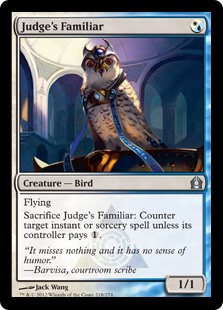 The second, which I find more offensive in many respects, is ignorance. They should know better; they've seen it before, there were resources available from which to learn, and/or they were told to be wary and they just. Didn't. Bother. It's the equivalent of walking into a test completely unprepared and just staring at the questions and guessing. Did you just blow off studying or did you incorrectly think you wouldn't need it? It was all there for the taking, and you punted it away.
The second, which I find more offensive in many respects, is ignorance. They should know better; they've seen it before, there were resources available from which to learn, and/or they were told to be wary and they just. Didn't. Bother. It's the equivalent of walking into a test completely unprepared and just staring at the questions and guessing. Did you just blow off studying or did you incorrectly think you wouldn't need it? It was all there for the taking, and you punted it away.
These are the situations I'm focusing on. Things that Modern players really should know, but seem to have forgotten. What should be common knowledge because they're all over the internet for the finding. So it falls to me to remind everyone.
Mulligan Correctly
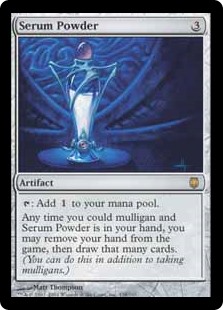 Jordan seems to go over this constantly (he's not the only one, but he specifically asked me to include this one), but most Modern players don't mulligan enough. Admittedly, mulliganing is a very tricky part of the game. Even with the best heuristics, practice, and strategy it's easy to get into grey areas. But that's no excuse. The London Mulligan has reduced the mulligan penalty enough that there's no excuse for keeping a borderline seven when there's a perfectly good six a-waiting. Between general power creep and deck refinement, the difference between most deck's average hands and their best has skyrocketed. As a result, the reward for mulliganing has increased independently of the London Mulligan's benefits. Don't be afraid to go for the big payout.
Jordan seems to go over this constantly (he's not the only one, but he specifically asked me to include this one), but most Modern players don't mulligan enough. Admittedly, mulliganing is a very tricky part of the game. Even with the best heuristics, practice, and strategy it's easy to get into grey areas. But that's no excuse. The London Mulligan has reduced the mulligan penalty enough that there's no excuse for keeping a borderline seven when there's a perfectly good six a-waiting. Between general power creep and deck refinement, the difference between most deck's average hands and their best has skyrocketed. As a result, the reward for mulliganing has increased independently of the London Mulligan's benefits. Don't be afraid to go for the big payout.
Unless you are the Jundfather and every card in your deck is as good as every other card in your deck, of course. Then you can (and Reid does) afford to mulligan less game 1. In that specific circumstance, the difference between the best hand (in a vacuum, anyway) and the second best one is small. In turn, that makes an extra card more valuable than the chance for a marginally better one. However, most decks aren't straight Jund or even Jund-like anymore. 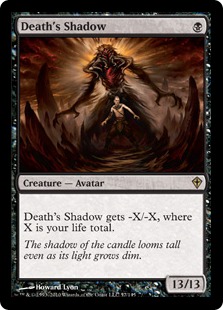 They're closer in composition and spirit to Grixis Death's Shadow or Izzet Prowess. They're generally powerful, but have certain openers that are far better than others. As a result, a random extra is less valuable than getting the right card early. And so they should try more often to get that better seven.
They're closer in composition and spirit to Grixis Death's Shadow or Izzet Prowess. They're generally powerful, but have certain openers that are far better than others. As a result, a random extra is less valuable than getting the right card early. And so they should try more often to get that better seven.
The problem most players have is their attachment to card advantage. More cards better than fewer is a fundamental lesson and usually the first piece of theory players learn. It's hard to overcome the attachment. But that's no excuse. Modern has never been the place to obsess over card advantage, and the format is getting faster and more powerful. Playing mediocre at best hands is increasingly likely to cost games. It's better to take a shot on a great hand than trudge along with a poor hand. I've struggled with this too, though playing decks that need to mulligan aggressively helped.
The Tron Mistake
What there is no excuse for is not mulliganing enough with a specific-card deck. While this applies to combo decks in general, it is particularly unforgiveable when it comes to Tron. This is the deck that everyone knew benefitted most from the London Mulligan when it was implemented, and yet I still encounter Tron players who don't mulligan for that turn 3 Tron. What makes it so frustrating is that anyone who's played Modern for a decent length of time has 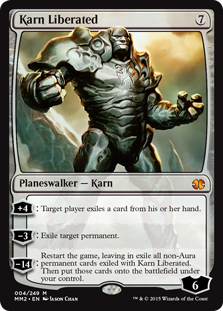 lost to Tron after they mulliganed to three. Maybe more than once. And yet plenty of Tron players still settle for hands that can't hit Tron on turn three. Even Jim Davis, who pretty much wrote the book on Tron mulligans, doesn't always follow his own advice (though he does admit his failings).
lost to Tron after they mulliganed to three. Maybe more than once. And yet plenty of Tron players still settle for hands that can't hit Tron on turn three. Even Jim Davis, who pretty much wrote the book on Tron mulligans, doesn't always follow his own advice (though he does admit his failings).
Now, in fairness, Tron hasn't been consistently popular these past two years. With the influx of players and Tron's relatively low price online, it is possible that many of the Tron players I've hit in Leagues or seen streamers play have been rookies. However, this is too pervasive a problem to shrug off so easily. The internet exists, and a simple search will produce a ton of Tron guides, every one of which will stress how important aggressive mulligans are. This is an easily correctable mistake, but it's one that players refuse to learn. It's time for players to overcome the fear, do their homework, and get to mulliganing correctly. Especially the Tron players.
Correctly Removing Infect
With that Tron bit off my chest, here's the mistake that actually got me on this thread: players have forgotten their removal sequencing against Infect. I realize that it's been five years since Infect was at its height, but it's never left the metagame. Players therefore already have the incentive to keep up their knowledge and skill playing against it. And yet I've seen a number of streamers punt badly against Infect.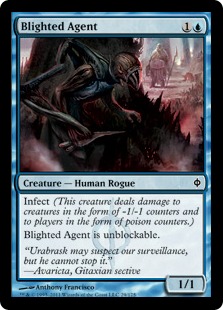 (No, I can't link a specific one because I can't remember who it was and I've already spent an embarrassing amount of time looking for the vods.) The problem seems to be complacency. Infect doesn't show up as a top tier deck on MTGGoldfish or MTGTop8 and is buried in Tier 3 in our rankings. Thus, players think that Infect isn't a threat and have allowed themselves to forget. This is a terrible mistake.
(No, I can't link a specific one because I can't remember who it was and I've already spent an embarrassing amount of time looking for the vods.) The problem seems to be complacency. Infect doesn't show up as a top tier deck on MTGGoldfish or MTGTop8 and is buried in Tier 3 in our rankings. Thus, players think that Infect isn't a threat and have allowed themselves to forget. This is a terrible mistake.
Players forget that Infect was only top tier in late 2016, not the entire year. It was hit as hard as everyone else by Eldrazi Winter, but up until Blossoming Defense was printed, it was highly volatile. Prior to 2016, and even after Gitaxian Probe was banned, Infect was a metagame call. I recall Todd Anderson winning SCG Cincinnati with Infect and saying after the fact that the only reason he did was that the metagame was primed for an Infect run thanks to players being overly focused on Twin. It was never supposed to be a highly played deck. Instead, it's something you pull out when the moment is ripe. And I've seen it happening.
Correct Counterplay
So here's your reminder: given a choice, don't try and remove an Infect creature on the opponent's turn prior to combat damage. Sometimes all you have is Condemn and sometimes Infect presents lethal, forcing interaction. It happens, and trying not to die is not a mistake. However, if the plan is to Bolt Infect during combat, that plan will only succeed if Infect is in dire straights. Remember, this is a deck that works by pumping up its creatures, and Bolting during combat lets Infect gain extra value from its pump spells. As letting Infect getting value from pump spells quickly translates into a dead you, it is something to strenuously avoid!
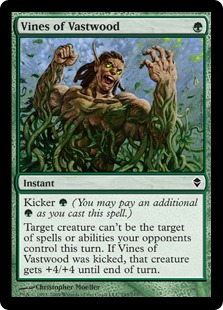 And the coast isn't clear for unequivocal removal either. Players forget that Infect runs 6-8 of Vines of Vastwood and Blossoming Defense with a few Snakeskin Veils for good measure. Playing any removal during combat is an invitation to let the opponent not only counter your spell but get in extra, potentially lethal damage. And players complain about Veil of Summer.
And the coast isn't clear for unequivocal removal either. Players forget that Infect runs 6-8 of Vines of Vastwood and Blossoming Defense with a few Snakeskin Veils for good measure. Playing any removal during combat is an invitation to let the opponent not only counter your spell but get in extra, potentially lethal damage. And players complain about Veil of Summer.
The correct time to remove an Infect creature is from the End of Combat step until your End of Turn. Doing so puts the ball in Infect's court to play a pump spell first, limiting their ability to use hexproofing to protect their creatures during combat. Plus, if they do Vines their creature, doing it outside combat means it's just a counterspell, and not a pump spell too. The best thing that players can do is force Infect to use its limited pump when the pump doesn't translate into damage. Also, never wait to remove an Infect creature. Unlike normal damage, there is no "healing" poison, so you can't get the damage back. Just kill it on your own turn.
Thoughtseize Threat Misevaluation
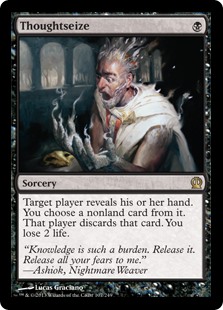 The final topic for today is a reminder about Thoughtseize and Inquisition of Kozilek: these cards answer everything. Choose their targets accordingly. I realize that this seems obvious, but the number of streamers I've seen talk themselves out of taking the threat they can't otherwise answer for fear of something worse is very large. I'm going to specifically call out Cooper the Red because he is the most recent I saw, but I promise you, look at any Youtube of a Thoughtseize deck and it will happen. In the linked clip, Cooper is Inquisitioning Death and Taxes and sees a nearly ideal hand. Rather than taking either protection creature, he takes Stoneforge Mystic and loses, never casting Scourge of the Skyclaves. Now, he is in a very bad spot in a bad matchup, but his mistake still cost dearly.
The final topic for today is a reminder about Thoughtseize and Inquisition of Kozilek: these cards answer everything. Choose their targets accordingly. I realize that this seems obvious, but the number of streamers I've seen talk themselves out of taking the threat they can't otherwise answer for fear of something worse is very large. I'm going to specifically call out Cooper the Red because he is the most recent I saw, but I promise you, look at any Youtube of a Thoughtseize deck and it will happen. In the linked clip, Cooper is Inquisitioning Death and Taxes and sees a nearly ideal hand. Rather than taking either protection creature, he takes Stoneforge Mystic and loses, never casting Scourge of the Skyclaves. Now, he is in a very bad spot in a bad matchup, but his mistake still cost dearly.
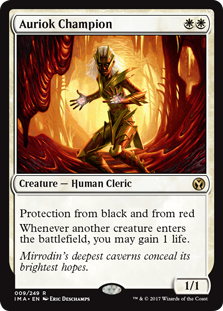 The mistake Cooper and all the other streamers have made is a conflation mistake. It's a known correct play to only take a duplicate copy if you can Inquisition again for the other one. Taking a unique card is always the best play, given the choice. When Cooper saw Auriok Champion and Mirran Crusader, he immediately lumped them together as unanswerable protection creatures. Since he couldn't take both, he took the next best card. What he forgot is that he had far more answers to Crusader and Stoneforge than Champion. Crusader dies to Bolt, Seal of Fire, and Kozilek's Return, and he has Assassin's Trophy and Kolaghan's Command for Mystic. Once it lands, only Tarmogoyf and Return answer Champion. Plus, Champion's life gain keeps Scourge from being cast. He needed to take Champion to have a chance, but didn't make the play.
The mistake Cooper and all the other streamers have made is a conflation mistake. It's a known correct play to only take a duplicate copy if you can Inquisition again for the other one. Taking a unique card is always the best play, given the choice. When Cooper saw Auriok Champion and Mirran Crusader, he immediately lumped them together as unanswerable protection creatures. Since he couldn't take both, he took the next best card. What he forgot is that he had far more answers to Crusader and Stoneforge than Champion. Crusader dies to Bolt, Seal of Fire, and Kozilek's Return, and he has Assassin's Trophy and Kolaghan's Command for Mystic. Once it lands, only Tarmogoyf and Return answer Champion. Plus, Champion's life gain keeps Scourge from being cast. He needed to take Champion to have a chance, but didn't make the play.
Answer What Kills You
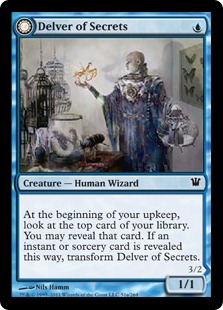 In general, it is better to answer something that will kill you rather than something that might kill you. I frequently see players worry about late-game cards rather than the short and it costs them. Jace, the Mind Sculptor is far more flashy and obviously powerful than Delver of Secrets, but an unanswered Delver kills before Jace matters. I see too many discard players lose to threats they could and should have discarded because they thought they'd draw an answer before it was too late. But they didn't, and so all the card advantage they removed wouldn't have mattered anyway. It's always tempting to hit the card that's strongest in a vacuum, but the correct play is to identify the chief threat given the flow or pattern of the current game.
In general, it is better to answer something that will kill you rather than something that might kill you. I frequently see players worry about late-game cards rather than the short and it costs them. Jace, the Mind Sculptor is far more flashy and obviously powerful than Delver of Secrets, but an unanswered Delver kills before Jace matters. I see too many discard players lose to threats they could and should have discarded because they thought they'd draw an answer before it was too late. But they didn't, and so all the card advantage they removed wouldn't have mattered anyway. It's always tempting to hit the card that's strongest in a vacuum, but the correct play is to identify the chief threat given the flow or pattern of the current game.
Learn and Improve
Ok, I'm feeling better. There are definitely more things I could lecture on, but there's only so much time in a day. The main takeaway I want to emphasize is that none of us are ever above study. Getting better is as much learning new lessons as holding on to old ones. The information is out there for the taking. Take it.




